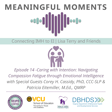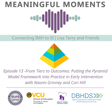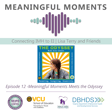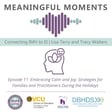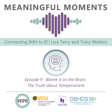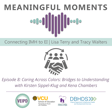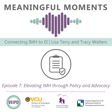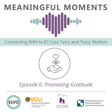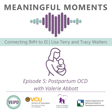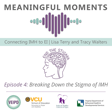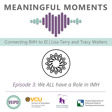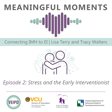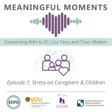Connecting Infant Mental Health to Early Intervention
00:00:10
Speaker
Welcome everyone to meaningful moments connecting infant mental health to early intervention. We are so excited to be here with you today. We are going to be talking about autism screening, implementing the mChat.
Autism Screening and M-Chat Introduction
00:00:26
Speaker
Now, this podcast is a collaborative effort through the Virginia Department of Behavioral Health and Developmental Services, and that is through a contract with the Partnership for People with Disabilities at Virginia Commonwealth University. My name is Lisa
Meet the Hosts and Guest
00:00:42
Speaker
Terry. I am an Early Intervention Professional Development Consultant at Virginia Commonwealth University, a partnership for people with disabilities. I am also endorsed as an infant mental health mentor in research and faculty. I still see kids doing providing developmental services, and I'm so excited to be here with you today. And Tracy, I'm going to go ahead and let you introduce yourself. Thanks, Lisa. It's such a pleasure to be back with you guys. It feels like it's been a minute.
00:01:10
Speaker
My name is Tracy Walters. I'm the state coordinator for Infant and Early Childhood Mental Health here at the Department of Behavioral Health and Developmental Services. I'm also an infant mental health specialist, so I get to work in that arena. And I am the Virginia Association of Infant Mental Health current president. So I get to have my partner in crime, Lisa, on our board there as well. So lots of good work being done. And I'm so delighted, Lisa, that we have Stephanie with us today. Hi, everybody. I am Stephanie Shrewsberry. I am a service coordinator with the Virginia Beach Early Intervention Program um and have been for the past 14 years now. And I'm just super excited to be here and talk to you guys a little bit about the M-Chat and what that's looked like for our program.
00:01:57
Speaker
Thanks, Stephanie. We are so excited to have you today. Stephanie actually approached me and she was like, this is just something that I think would be a great topic to talk about. And so we are really looking forward to asking you lots and lots of questions about the implementation of the MChat. But before we even get to that, let's really talk about
Autism Prevalence and Statistics
00:02:15
Speaker
what autism or autism spectrum disorder, ASD, really is. And so that is going to refer to a broad range of conditions characterized by challenges with social skills, repetitive behaviors,
00:02:29
Speaker
speech and nonverbal communication. In early intervention, we often see a lot of children that can display some of these characteristics, right? And so that's where we do the M-Chat. But let's talk about some of the stats that we see with autism and why this is so important to make sure that we are doing this grading first. So when we're looking at autism, One in 36 children in the United States have autism. And that is up from that previous rate of one in 44. And you can find all of these stats on our resources. We're going to link you to that. That comes from autismspeaks.org.
00:03:06
Speaker
I thought I would add this because I thought it was interesting that 1 in 45 adults in the United States have autism as well. And I didn't realize that it was such a high rate as well. I don't know any thoughts about that, Tracy, Stephanie? You know, I'm still stuck on because when I was looking at the ah current statistics, I remember sitting at another desk and thinking when it was 1 in 63. and looking now at what the, you know, it felt like it was one in 63 for a minute. And now looking at the rates, I'm like, what is going on to contribute, right? what is What's happening here? And so, yeah, I do think it's interesting ah from where we sit to see that these statistics are the same between these two groups and how that's really playing out in our community. Stephanie, what do you think about it all?
Autism Characteristics and M-Chat Use
00:04:02
Speaker
so I think, and then this kind of plays into the kids too, but I think we have a system now where we are able to diagnose autism as 40 years ago, it wasn't happening a lot. So I actually think, I mean, this is just my personal opinion. It may even be higher in adults that just haven't had the formal diagnosis of getting that or haven't seen a physician or gone through any of the testing. but before Lisa just said that I did not know it was even that high. So that's that's a pretty big number.
00:04:34
Speaker
It is, yes. And I mean, we were just talking, Stephanie, earlier too, that we are seeing so many of these characteristics in a lot of the children that we're serving. Like, you know, I'm still providing developmental services and a lot of the kids that I'm seeing, all of them have these characteristics, you know, and it's so, it's very interesting because we'll have to utilize that in chat. But I do want to kind of break down some of the other statistics um to kind of raise awareness about that. Because in the United States, about 400 boys and 100 girls have autism, right? So boys are nearly four times more likely to be diagnosed with autism
00:05:16
Speaker
than girls. And we have a great talks on Tuesday and that Dr. Subarna Darya did for us about autism and girls specifically and how that really does get underdiagnosed and what that looks like. She talks a lot about masking. And so I will also link that into our resources, but it's a really um interesting thing just to kind of keep in mind when we are providing these services. And we look at the autism prevalence in lower is lower among white children than other racial and ethnic groups. So white is 2.4%, black is 2.9%, Hispanic 3.2%, and Asian or Pacific Islander is 3.3%. Tracy, did you have any thoughts about those? Yeah, I was just thinking about that. You know, my mind is going to be around a lot of things, but that masking, right? That that idea of masking.
00:06:10
Speaker
And so many times, right, if it's a child
Administering and Training on M-Chat
00:06:13
Speaker
who's not being disruptive in the classroom or in the childcare center or wherever, you know, that child is spending their day, then it's not an issue, right? We just kind of let it go. We may not get into that intervention piece of doing the test. I don't know, Stephanie, do you see that or? Yeah, we, so I love the end chat and obviously we're going to talk a lot more about it and what it's looked like for our program. But doing it with boys versus the girls does look very different because of that masking. um So there is kind of a gap there, and there's some things that we need to figure out as a program on how are we going to talk to this family, even though they scored a zero on the M-chat, about moving forward with developmental peeds, some of the concerns that we're seeing.
00:07:03
Speaker
Right. Exactly. Because a little girl might come up and say, like, here's my baby doll and do some great pretend play skills. But there still could be other characteristics of autism that we're looking at. So it is really important. But let's go ahead and define the M-Chat. Tracy, you want to go ahead and define that for us? Yeah. So a good many of you guys may have used the M-Chat or read something about it, but it's basically the modified checklist for autism and toddlers. And it's a psychological questionnaire. Stephanie, you're going to be the expert, but I know that it evaluates risk for autism spectrum disorder, and it's generally used for children who are like 16 months to 30 months um for that cutoff. It's a 20-question test that's filled out by the parent, and then there's a follow-up portion as well that can be used. So it's really to look at classification for medium to high risk of autism in young children.
00:07:59
Speaker
um Is there any other thing that you'd like to point out, Stephanie, about that checklist and what it looks like in real time when you guys are are disseminating that? Yeah, in real time, it's actually great because um we don't, a lot of the questions that are asked in the functional assessment, you can look on it and figure it out. So it's not like you're doing a whole other testing portion. You look at these questions after you've been with a child for an hour, an hour and a half, and you can pretty much figure out what those questions are. We do still prepare the family at the intake and at the assessment. This is what we're completing today so that they know what that's going to look like. I would imagine that that prep time, I know for myself as a parent and now as a grandparent, it's really important to kind of understand what's going to be happening, right? Because parents are coming in, they're feeling very anxious. They're feeling very worried. um
00:08:59
Speaker
And so and they just have so many wonderings too about what's happening for the for their child. um And so I can just imagine that you being able to walk them through that, how far that must go with the family just to really put them in a more protective space and let them know that like we're we're all going to be looking at this together um and creating that safe space for them.
00:09:26
Speaker
Yeah, I agree. And I think one of the things that we want to make really clear is that when we're thinking about the mChat, it is only a screener. So this is not diagnosed for autism. So it only screens. And if a child shows a lot of red, um not red flags, a lot of characteristics um ah for autism and they're at high risk, that's when we want to make the referral for them. um I was thinking red flags in my head because I was like, oh, I wanted to make a note to make sure that we did talk about that, that we don't say your child has a lot of red flags. Because as soon as you hear red flags, what do parents usually do? Like, whew, right? um You think red, bad. And so it's not a bad thing if a child has those characteristics of autism. And so we want to just kind of reframe how we are saying that and say characteristics of autism.
00:10:20
Speaker
So let's talk about what this looks like in your program, Stephanie. So who trains everyone to administer that M-Chat? So each program or each agency, the ones that provide the speech, occupational and physical therapy, they're supervisors, owners of the programs. They are responsible or for training all of their therapists. So if they hire somebody new, that is something that they would train them on before putting them out into the field. Within our program, um our developmental Specialist Supervisor Jennifer Pagano. She is responsible for training all of our educators. um I know people are asking, well, who can do it? What does that look like?
00:11:00
Speaker
Technically, anybody could do it, but within our system, our Virginia Beach Early Intervention System, we do the PTs, OTs, speech, and developmental specialists. Have I done it before? Yes. That's because I've been trained on how to do it, and there was a couple of circumstances where there was a new therapist that didn't feel comfortable, and then we had to walk through it. Once you get through the training portion of it, like Tracy said, it's only 20 questions. It's very easy to score, so you know what exactly to look for. There's these three questions that you really need to look at, and you can easily figure out if it's low, medium, or high risk.
00:11:41
Speaker
That's great. I'm thinking, too, Stephanie, as you're saying, that you know that training piece is so important, right? And really, that quality of training is really key. It really brings something
Different Screening Tools and M-Chat's Role
00:11:52
Speaker
to mind, because you know as early interventionists ah Folks who are working in infinitely childhood mental health, right? We're always trying to stay on top of the latest information, right? We're trying to have all of the the the best tools at our dispod disposal to really support children and families and their growth trajectory. what I'm often on calls across the Commonwealth with local system managers and and folks from early intervention.
00:12:21
Speaker
um and I know that there was a point in some of our work that there seemed to be some confusion about the M-Chat. And I just want to lean on your expertise with this while I have you captured on the call. There seemed to be some confusion about using the M-Chat as a social-emotional screener. ah There was a conversation about really looking at recommended social-emotional screeners and how you know how needed these are in the work that we're doing.
00:12:52
Speaker
And someone had brought that as a tool that they were using or are considering. And I guess, how does your trainer, because it sounds like you've got some really good folks on board, clarify for the folks who are being trained in your program the difference of like the mChat and like a social-emotional screener. um I was kind of taken back by that. And so I think this is just a great opportunity to have the conversation.
00:13:21
Speaker
So that's interesting because of course the questions that are on the mChat are going to be social questions, language questions, et cetera, but it should not be used as just a social screening. um This is a screening that is specifically for autism and that is what its use is for. Within our program, I'm not sure what the rest of Virginia looks like or other systems in the US. We not only do the ASQ, but we do the ASQ SE, which is the social-emotional
Impact of COVID-19 on Child Development
00:13:54
Speaker
screen. So we have that as our big social-emotional piece. So that is what we rely heavily on to see, you know, before going out for the assessment, what is this child looking like in a social setting? um But the mChat itself is used just for that autism screening. Yeah, thank you for that clarification. and
00:14:17
Speaker
You know, I think listening to so you talk about it, I could see where since the context of the questions is about that social interaction, maybe there's just been that that confusion there. What do you think, Lisa? Have you heard that, seeing that? Yeah, you know, and I could see where that misconception can come from. But I think it's really important that when we're thinking about social emotional, we're also thinking about some of those behaviors that might show up that can be impacted, impacted from
00:14:49
Speaker
attachment from trauma that the child has experienced. And so it's a it's way different than those characteristics of autism in that sense, you know, because the environment can play such a role. And so I think when we're looking at the ages and stages, questionnaire, social-emotional, that's a lot different than the M-Chat. Yeah, I think also, Lisa, I mean, you bring up such a good point, right? There's a whole host of factors, right, that can, when we're really thinking about a child and thinking about a family, really what comes to play when we're really looking at that, ah you know, the screeners and assessments, even thinking about the pandemic, right? I mean, I know a lot of people are like, well, the pandemic's over. Okay, well, there's a lot of residual things still happening for all of us ah where the pandemic was concerned.
00:15:37
Speaker
And I know I've talked to a lot of people who are like, you know, is this is this autism or is this where this child has been isolated and had no play interaction and no social interactions? And so Stephanie, I'm wondering, yeah what did you see after that? I know we're getting more and more removed, right? But we're still seeing the residual effects of the pandemic. And I'm wondering if you feel like there's a pushup in that area ah for you guys. So I don't have like exact data on this. This is just from personal caseload and everything, but there was after COVID, you know, after 2020, when we opened back up, we weren't doing things virtually. There was absolutely a spike in speech delays. We would get those, um you know, we haven't been out in the community. We haven't been around other kids. We haven't been around anybody, um their daycare clothes, et cetera.
00:16:30
Speaker
So I think it was kind of hard to, you know, I would have parents that say, that would say, is this something I should be concerned about? Should we talk to our pediatrician about autism? And this was before we started implementing the M-Chat. And I think that's why this tool is so important with talking with families about talking to your pediatrician, having that referral to developmental peeds, et cetera. So that's opened up a whole new world for us in making that conversation more comfortable. um But like I said, I don't have exact statistics. I'm sure we could go back and have Jennifer McElwee pull up some. But I can say with confidence that all of my coworkers would also say that we saw that spike. We absolutely did. I have to say it's kind of leveling out now. I mean, we still have a lot of speech delay children
00:17:26
Speaker
um But since everyone is back in daycare, back doing summer camps, all of those wonderful things that are great for a child's social emotional development, it's not as prevalent as it was three years ago. I do think that's interesting, Stephanie, because even with preschool teachers that I currently work with, what I hear from them a lot is this group of children is different than any other group of children that I've taught. And they say they look different. They respond differently. They you know they interact with each other differently. So um I think your reflection about we're getting back to childcare. We're getting back to camps. We're getting back to the things that have been a normalized experience for children. It is so healthy for everybody. Absolutely.
Discussing Autism with Families
00:18:17
Speaker
Yeah, so Stephanie, you mentioned like this was like before we started implementing the MChat. So why did you all decide to start beginning that in your system and implementing that screening? I think for the exact reasons of having those comfortable conversations with families and knowing where to move forward from there. So the reason why I wanted to come on here and talk to you is because when I first started with the program, the word autism scared me. I was like, no way I am talking to families about that. That is not my job. I do not want to hurt their feelings. But as you become more confident and more wanting to make the family aware of things and give them all these resources, you're really doing a disservice if you sweep things under the rug. So
00:19:14
Speaker
that conversation has really changed for me over the past past probably like five years. And it's just been so much easier with the implementation of the M-Chat and preparing them for what it's going to look like. I think you touched on a really good point, Stephanie, too, because, you know, I do a lot of training around social-emotional a lot. And when people tell me that they're having a hard time having these conversations with families and bringing it up, we have to realize that that's our own discomfort, right? This, at the end of the day, it's our job to make sure that we are fully transparent with the families, is that we are informing them. What they do with that information is ultimately up to them, right?
00:20:01
Speaker
And I think people can struggle, too, because families are in different stages of grief in the process of their children and having a delay. I think almost all the families that were we have coming into early intervention, they are experiencing some form of grief, whether they're accepting it now. We have a lot of families that always will say, you know, like, is this my fault? Did I do this to my child? And so the guilt that they're carrying with them And so I think, you know, the M check kind of rounds us all were on the same page. And this is something that we're doing to inform the family and just be mindful of our own discomfort. Right. And remember that Tracy, did you want to add something? Yeah, I, there's a podcast that I listened to. Um, the, the lady's name is Mel Robbins. And one of the things she says is be where your feet are about being present. You know, it's a reflection about being present.
00:20:56
Speaker
And so I think one of the things that we are really working hard on in early intervention as a system is having those more difficult conversations. I think that we're growing in that direction. And I think before we were hedging around that piece of this stay in your lane, right? Like I am not an autism expert, therefore I'm not getting into this, you know, or I am scared to have this conversation. I don't want to blow the dreams of these families apart. It's much harder for families to be in limbo. It's much more difficult because when they by the time they get to us, they already know they need some supports. Like something is not happening the way that they thought it might go. Or someone has said, hey, we need for you to go and get you know some testing done. So I think the bravery and the courage of people like Stephanie and other early interventionists to really
00:21:55
Speaker
One, get yourself the education and the information that you need to be that rock for that family and to lean into the facts, right? This is what the screener says. um Here's the information for you. And then let them take that ball and run. But I i do think that that has been real growth for early intervention across the Commonwealth. And I don't know, Stephanie, are you experiencing that in your own work? for sure. And I think you guys both nailed it with the personal growth. Like I said, I've changed a lot as a service coordinator over the past 14 years. But I think about the families that myself or other therapists didn't want to bring this up while they were in early intervention. And then to me, that's just a missed year or two of opportunities that if they get did get the ASD diagnosis that
00:22:48
Speaker
they would have been able to have like ABA therapy. So you have to think about the family. This is, if you feel uncomfortable, that's you, but you have to have these conversations with them so that they can prepare. um I think as a whole, as our program, I can speak to Virginia Beach, we have done an excellent job of really talking with these families. And it is not something that is swept under the rug anymore. um And I think at the beginning, too, I would always put myself in their shoes and say, well, I don't want somebody to have that conversation with me that would make me sad, but that's not the case. We need to open up these doors um so that the family has all of the information, all of the resources that they need to support their child. And I think you're right, Stephanie. I think sometimes the parents just need something. They just need something to hold onto so they can start moving forward, right?
00:23:44
Speaker
and so Just by going over that screener with them and and saying what you're seeing and being in that space with them makes a world of difference. It really allows them to reflect on, okay, so other people are acknowledging like what we're seeing and validating and normalizing that experience for them I think is a really powerful gift that we can give to families um and the children.
00:24:14
Speaker
Right. I was just going to add too. And I think on the other side of it, right, sometimes there's those families that aren't on the same page or they don't think that their child's delayed, or there could be a cultural component to it, right? Because if they were living in their country, then their child wouldn't have a delay. And so I think that you know we just have to be very mindful of the message that we're giving family is how we're talking to them, how we're speaking to them, how we're listening to them, right? Usually when I am completing the end chat, like the first thing I'm going to ask a family is, have you heard about autism? Tell me more, like what have you heard about it? Is this something that's concerning to you? And and it just gives me a little bit more information. and
00:25:02
Speaker
kind of I get some insight onto how they feel. Like if they think that their child might have some of those characteristics or they're like, oh no, I'm not worried. And then sometimes you're in those situations where both parents are on opposite ends, right? Of what they think. And so, um so that's why I think that MCHA is just so helpful when we are utilizing it because it's just grounding that conversation. yeah And I'm so glad, Lisa, that you're bringing up the cultural piece of this too, right? I mean, I think whatever family that we're working with, we need to meet them where they are, right? And so I think getting their understanding is a beautiful way to do that. And also, like, tell me about your child, right? Just tell me about your child. You know, what do they enjoy doing? Taking some time to really not just look at these screeners that's going to give us important information, but
00:25:56
Speaker
What does this child look like in the community? What does this child look like at home in the context of your family? We need to have that information because that really gives that family also an opportunity to share their joy about their child. And we don't want to lose sight of that. And I think that cultural piece that you talk about, we'll have to connect this as ah as a resource. But there's a really beautiful book. It's been written many years years ago now. But it's um the name of it is When the Spirit Catches You and You Fall Down. And if you haven't read it, it is a beautiful ah description of a family ah going through the early intervention process and essentially how they viewed their child and how a system viewed their child. And so we will make sure that we link that. And I think the other thing, as many of us in early intervention are probably familiar with, that poem A Trip to Holland. And for so many families, you know, while we're,
00:26:53
Speaker
When we're going through the pregnancy and then we go to the hospital and then we have the baby and we have all the celebratory things that go along with the baby, when things start to feel different or we're wondering about
Role of Early Interventionists
00:27:05
Speaker
our child's development, we can sometimes find ourselves in a different space and what that's going to look like. And so I think that poem is a beautiful reminder of our journey is very specific to the child we have and what joy can come from that. um Have you seen that, Lisa? Yeah, no, I was just going to like add to because I was thinking about it and it brings up a good point to that when we like Stephanie, you were mentioning earlier, like this is how I would want it. Would I want somebody saying this to me?
00:27:37
Speaker
And I think, you know, along with that cultural piece, we have to remain aware of our biases, right? Because this is what I think I would want, but there's a reason that you're going to want that information a certain way or you do or you don't. And so we have to be mindful of what our biases are because I hear a lot of times just people getting so frustrated because they're like, I just feel like the family doesn't understand how delayed their child is. And it's not our job necessarily to make them feel a certain way, right? um what What we do is we just plant the seeds, we just plant the seeds, we give them the information until they are, they're on this journey, and they're ready to accept that.
00:28:22
Speaker
I always think Lisa, yeah, I always always think about the kitchen table wisdom. ah You know, we're the first ripple in the pond. Yes, right. What we're there to do is share what our reflections are, share what the screener says, right? Share the information with the parent and a parent may be ready or not ready to receive that information. But we're the first ripple in the pond and always say, you know, you throw that You throw that pebble out, and then they may not be ready for it. We hope they are, but it may come later for them that they're ready to accept that information. I mean, what about you, Stephanie, and thinking through that piece with families? Yeah, and once again, the end chat has just made this so much easier, because at the intake of gathering all this information about the child, I don't jump right into that's what, you know, this is what we're going to do. You know, I get to know them a little bit.
00:29:20
Speaker
um And then at the end, I explained what the assessment's gonna look like, what the testing tools that we're using. And I explained in detail that what the Amchat is. And some of them are familiar with it because they have had it done at their pediatrician um at their pediatrician's office. So that's kind of a great, if they have had it done, it's kind of ah an icebreaker to say, oh, okay, you know what did you guys talk about at the appointment? um But then if they haven't heard about it, you know we say this is something that is implemented in our program, 16 months to 30 months, no matter what, we will complete that, et cetera. And like you said, we are the first people that they are talking to about their child having some sort of developmental delay. The way that we present the information with compassion and with support is just as important as the information.
00:30:16
Speaker
um It is uber important to read the room and know how this family is feeling about what could possibly come at the assessment. This this really goes back to a concept that I love in infant mental health, which is, you know, you can be therapeutic in showing up for a family, right? You can be therapeutic just in your being. You don't have to be a therapist to be therapeutic for a family. And I think that, compassionate outreach for a family is so important. And I think sometimes can be a real struggle because when you're doing multiples of these a day, ah you know, multiple screenings with families and you have families coming in and going out, right? I think one of the things that's really important for us to remember as professionals is this might be the 10th one you've done today, but it's their first. Exactly. It's their first. And it's real deep and real personal to them because that's their baby.
00:31:17
Speaker
So thank you for the reminder about that. I think it's really important for us to hold on to that. Yeah, yeah.
Assessment and Follow-Up Process
00:31:26
Speaker
So let's keep digging into like what this kind of looks like and how you're implementing it. So I know we already talked about the criteria for screening 16 months and older. Are you only completing this at the initial assessment? So we do it at the initial assessment if the child is in between 16 to 30 months. If a child comes in at say 10 months for a gross matter delay, but then they have their annual a year later, um that's when we would do it if the team is having concerns. And then once again, that is our way of saying, hey, at the annual, we're gonna complete this, your child is now 18 months now. um It is something that we do.
00:32:08
Speaker
You don't have to do it at the annual IFSP. It's kind of a group decision on, I would really like to talk to mom about what's going on. And then we kind of decide as a team what that will look like. Cause it's not formal testing at the annual. So you're not digging in with all these questions. So the only real screening that you would be doing is the MChat. Yeah, I was going to add too, Stephanie, it's interesting, like as a um developmental services provider, like when I go in after the assessment for like my first visit, because I'm always kind of revisiting the IFSP, going over it, seeing if they have questions and reviewing those goals, as I'm kind of like talking them through it. And when they have the mChat,
00:32:53
Speaker
More often than not, the families are like, oh, I don't remember. I don't know what that is. I don't even remember having like that discussion. I think it's just because sometimes at that assessment and the IFSP development, there's so much going on, right? And so I think it's a really great idea for providers to make sure that they are following up after that initial assessment or even a service coordinator following up with the family after, you know especially if they're going to refer to the developmental pediatrician or whoever, and for some ah more deeper autism screening assessment. Yep, go ahead. Yeah, I think that that is a great point. The, you guys have done assessments. I've done, I can't even, I don't even know how many. The amount of information that is given to you at the assessment is, it's so much. It's so much to take in. My youngest son was in the program and even being on the other side of it, it's still a lot. It's a lot, even though I knew what to expect.
00:33:53
Speaker
It was my child, it was a different experience, and um it is uber important to follow up after the assessment on what that's gonna look like. Typically what I do is once I know who's going to pick that child up, I'll say we have presented them with information on developmental peats. We have talked about other resources as well. I just wanna make sure that if that is something that they want to do, that they stay on top of it. In Hampton Roads, the wait list for developmental peds is around... Insane. Oh, it's so insane. There's a few private practices that'll do it that'll take a couple of months to get in, um but still that depends on insurance and whatnot. So it is so important to follow up with the family and just make sure
00:34:45
Speaker
Hey, I know we unpacked all of this information. Um, do you have any additional questions on what that would look like? So outside of testing in all areas, developing all these goals, et cetera. Here I am at the end of it talking about the school system and the in chat results and developmental piece. And if you are not in the child development world, it all sounds like a foreign language. So we have to remember that just cause we're throwing out all these acronyms and saying all these things and we do have to follow up. Lisa, that is, I'm so glad you brought that up because I i need to do a little bit better ah about that myself. Cause you feel like, okay, well I gave them the information, and but we need to make sure that they're, if they want to follow through that we follow up with them. Right. Well, you're kind of bringing up some of those conversations. So let's just talk about that. Like what do these conversations look like once you complete the M chat and then you are having that conversation.
00:35:42
Speaker
Like what does that look like? What is it? What are some key things that the providers or service coordinator are saying? What are some of the questions that the family may have for you or that you've seen? So typically after we talk about the narrative and the scores and where where they are developmentally, then we will talk about the outcome of the screening. For me, I have mostly had that conversation with them since I was that first contact with them. I met with them, or I made the first phone call, met with them in the home for the intake. They know me. um the other Once I start talking about what um the what the screening was, if it was low, medium, or high,
00:36:32
Speaker
then I'll have the therapist chime into. And honestly, it's just been kind of an organic conversation. This is what we're seeing. This is what we suggest. Do you have any questions? um There have been some really heavy conversations that we have had and those ones are tough. I just, you can just feel the the weight of the world on the mom and dad on like, what's next? What is this going to look like for us? When you have a wonderful assessment team, which we all of our assessment teams are wonderful, then it is so amazing to see all of us come together and support that family for what is next for their child.
Supporting Families Post-Diagnosis
00:37:18
Speaker
Yeah, I agree. I mean, it is
00:37:21
Speaker
I will tell you, I agree with you. Like when I first started doing this, I just felt like a little intimidated, you know, bringing this up and having those conversations with the family. And I think just because I am such an empath and so I just take on people's emotions all the time. And so I feel I'm 100% and then I just, I feel bad, you know, having those conversations. And so I always want to make sure that I tell families, you know, like, This diagnosis, whether or not your child gets it, does not change what I'm going to be doing with your family to help support you. Like it doesn't change services at all in our early intervention. The only thing the diagnosis will do is give you access to additional resources because now they have a formal diagnosis. And so you can get additional resources that your insurance will cover.
00:38:14
Speaker
And I think that's a big thing too is a lot of families will say, well, what does this look like for us now? Once they, if they do go to follow up with developmental peeds, they do have the diagnosis. What can you tell me exactly what that's going to look like? And so I just had a wonderful family a few months ago, they came through. He was able to get in developmental peeds from a cancellation and he had a diagnosis within two weeks of the assessment, which is unheard of. um And she called me, she said, Where do we go from here? And I said, where you go from here is what you think is best for your child. There are so many different roads that you can take. There are some families that only go to part B in the school system after early intervention is done. There are some that do part B in ABA, private therapy. We have wonderful centers here like the Maverick Learning Center, um the Eliza Hope Center.
00:39:10
Speaker
Whatever you do with your child, it may look completely different from another family, but you have to make a decision that best supports your child and your family at the same time. Do you have any specific like resources that you share with families? Like the Autism Speaks, that's kind of like one that I was thinking of. I always get them hooked up with the Autism Society of Hampton Roads because I feel like that is a great place to meet parents and have other interactions with families that have been in the early intervention system and that have done all of the other things in Hampton Roads, such as, you know, they've worked with a specific ABA provider. I think it's great. Our early intervention is wonderful and some, you know, we do have those center-based classes.
00:39:58
Speaker
but being able to hook them up with other people that have been through a similar situation is key. That is really gonna help them guide them on, okay, well, maybe I'll try this and try that, and then figure out what's the best fit. Yeah, i I couldn't agree more. So, Stephanie, are there any other last things that you wanna add about implementing the MChat?
M-Chat's Limitations and Contributions
00:40:25
Speaker
Well, there is one thing I want to add that I've totally forgot forgot to say at the beginning, but this is not medical advice from me. I am not um you know qualified to give a diagnosis of autism. This is all from my personal experience and what that has looked like for me um as a service coordinator with implementing this screening tool. I think that the biggest thing as this has opened up a lot of doors to
00:40:54
Speaker
having these sometimes uncomfortable conversations with these families to give their child the best outcome and give them the best support that they can get. um I think rewinding a bit back to the female versus male. There are some falls with the M-Chat when it comes to that, but overall, this has been a wonderful tool that we are able to now discuss these things, talk a little bit more in depth, and we're not just sweeping it under the rug so that they can get to what they need as soon as they can.
00:41:31
Speaker
I agree. And I think it's really important to make sure that we are having those conversations. And I just feel like the mChat really does help provide that foundation for us to have these um discussions around like what are some of the characteristics that we're seeing, and then we can make ultimately the referral for a formal diagnosis um for them to get tested and I think you know you just brought up so many good points and I just appreciate the perspective that you have working in the field and implementing this and and even to like your honesty about like where you've been and how far you've come personally as a service coordinator. I think that's really important for people to hear and even sharing a little bit you know as you're going through it as part of your own
00:42:18
Speaker
parenting journey too. So I definitely just appreciate, you know, everything that you've talked to us today about. I just want to let everyone know that all of the resources that we talked about today, they will be added as links. So feel free to check those out. But a huge, huge thank you for Stephanie Shrewsberry. for being here today, being our guest speaker, joining us, even approaching us to come up with this idea. If anybody ever has ideas that they think is important that we should talk about on this podcast and you want to be a guest speaker, maybe you just have an idea, always feel free to reach out to
00:42:57
Speaker
myself or Tracy. and Join us again next time. Please make sure that you subscribe to the podcast on iTunes or Spotify. You can also find our video podcast on YouTube. For more information, you can visit VEIPD's website for resources, tools, and archived webinars. You can also visit VAME, which is V-A-I-M-H for additional resources. Thank you all so much. Thank you, Stephanie, again for being here. Thank you, Tracy. Yes, thank you.

